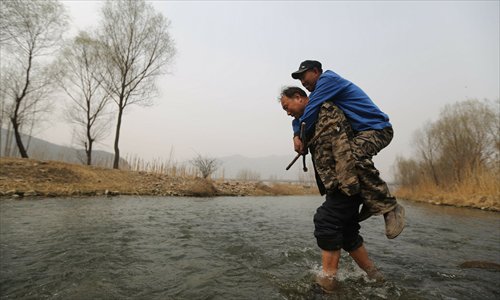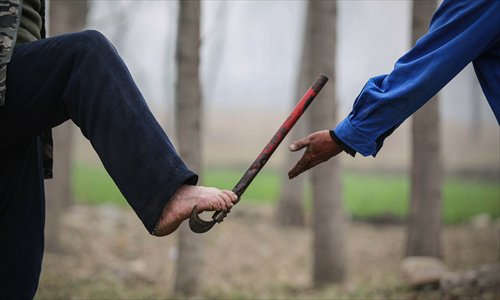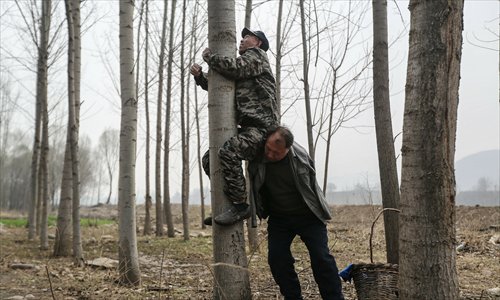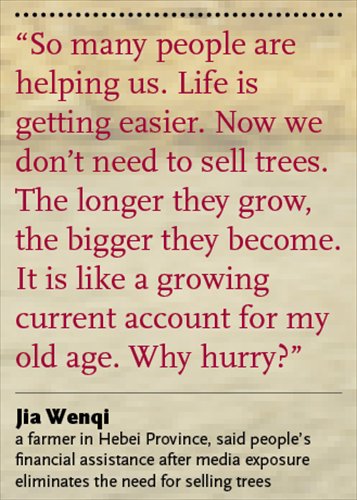Disabled tree-planting duo are vexed by media spotlight, cynical reports
Two disabled elderly in Hebei Province who have planted 10,000 trees in their village's wasteland for a living, never expected that they become environment protection models in media reports. What's more, the attention they attract are throwing their lives into chaos rather than helping them out.

Jia Wenqi who lost both arms carries his blind working partner Jia Haixia across a river to plant trees. Photo: CFP
Jia Wenqi and Jia Haixia, both disabled men hoping to make a living through planting trees, have shot to fame overnight all over China, and even globally.
After the Chinese and foreign media outlets reported their work, which includes planting about 10,000 trees on a wasteland in their village in Hebei Province, accepting media and visitors has become a key task for them.
"We're doing interviews with the Dragon TV, and tomorrow a CCTV crew will arrive. Our schedule is rather packed," Jia Wenqi, who has lost both arms, told the Global Times. Jia Haixia is blind.
Chased endlessly by the media, the two elderly men from a village in Jingxing county, Hebei Province actually have a rather complex feeling toward their media friends. They became a target of intense media interest in 2014 after hitting the headlines in provincial and national media. At that time, they were rather grateful to the media because it helped their endeavor to plant trees was recognized by the society, and brought them some assistance.
But now, as more and more media close up, Jia Wenqi said they have become "repugnant" toward media due to their casual attitude in writing reports. A while ago they were portrayed as heroes and models in planting trees. In a moment, they turned into sly peasants who lied to the media and public about their motivations to get praise from the society.
"We've been telling the truth, but some media twisted our meaning and reported as they pleased," Jia Wenqi complained.
He's particularly irritated by a recent report, which said that they want to sell the trees but cannot after having received so much praise and being idolized, and that they fanned media interest by concealing their real motivation behind planting trees.
"Some tabloid newspapers just quoted out of context," said Jia Wenqi, "Right now we are attracting support from the society. We don't need to sell the trees at all."
"But when I get old and cannot work anymore, and no one helps me, what else can I do besides chopping and selling the trees [for a living]?" he retorted.

Jia Wenqi passes a sickle to Jia Haixia. Photo: CFP
An independent decision
It's been 14 years since Jia Wenqi and Jia Haixia started to plant trees. The wasteland, which used to be a land of cobblestone and sand, has now become a small forest of some 10,000 trees.
"We indeed planted those trees for money originally," Jia Wenqi told the Global Times.
Born in 1963, Jia Wenqi lost his arms at 3. Having got used to it from an early age, Jia Wenqi learned how to collect dung, swim and even write with his feet. After graduating from middle school, Jia Wenqi first worked in the forestry team of the village, planting and looking after trees.
Later, he made a living by performing along with an art troupe for disabled people and traveled all over the country. "I used to earn money easily just by writing Chinese characters with brush," he said.
But in 2001, his father suffered from hemiparalysis and Jia Wenqi had to quit the job and look after his father at home. Disabled and without an income, he thought of planting trees, the only thing he thought he could do, to earn money.
He asked Jia Haixia, a childhood friend from his village who lost eyesight in an accident in 2000 and has been living in poverty, to become a partner. They eventually chose a piece of wasteland about 33,000 square meters along a river, and signed a contract with the village committee to ensure they are the owners of the trees on this piece of land.
"To get rich, plant trees … After the trees are fully grown, the village committee will not charge any fee. The income from the trees will go to the growers [Jia Wenqi and Jia Haixia]," the contract reads.
Then two disabled men started to plant trees in the spring of 2002 and have worked together for 14 years.
But it has not been a smooth passage. The first year they planted more than 800 trees but all except two died during a draught. To get branches as saplings from big trees, armless Jia Wenqi had to squat down to let Jia Haixia climb the tree from his back. And they used to be scolded a lot when they had to get branches from trees in other villages.
Fortunately, their efforts paid off in the end. Now the trees of different ages have become a small forest attracting birds. But what they did not expect was that the trees will attract so much attention from the media, some of which unwanted.
"A big tree attracts wind," Jia Wenqi quoted a famous Chinese saying, trying to explain what happened to them and their trees.

Jia Haixia climbs up a tree with the help of Wenqi. Photo: CFP
Becoming a model
Before a video story by GBS, an app of CNN, went viral and made them known worldwide as environmental role models, the disabled duo and their trees had already created big waves in China in 2014 when they were first reported by media.
Many reports said it was Jia Wenqi who took the initiative to get the media to report on their story. But Jia Wenqi explained to the Global Times that it was a man from the same village who worked at china.com.cn who decided to write a report about him after listening to their story during the Spring Festival of 2014.
Besides living independently as a disabled person, Jia Wenqi also once saved two girls from drowning with his mouth and teeth, which made him a model for the whole county to learn from. Jia explained that it is his fame in the local area and his planting of trees that inspired the reporter to write about them.
Whether it was with their nod or not, the first report published on china.com.cn in March 2014 helped publicize their efforts in green coverage and environment protection.
"He [Jia Haixia] thought planting trees could protect the environment and was good for the country and the people, while it could bring him some income with low cost," the report said, describing their motivation behind planting trees.
"Talking about the future, Jia Haixia and Jia Wenqi said they will continue to answer the call of the country to enlarge green coverage … and create a bucolic refuge of shady trees where birds will sing for us," the report continued.
The impact of the report was huge. As Jia Wenqi recalled, after the report was published, many media, including the Shijiazhuang Daily, Hebei TV, Xinhua News Agency, as well as foreign media, approached them. They all went on to praise them as models for environment protection, while their poverty, the real motivation behind planting trees, was generally ignored or downplayed.
A local newspaper in Shijiazhuang reported the visit of Sun Ruibin, then Party secretary of Shijiazhaung, to the Yeli village where Jia Wenqi and Jia Haixia lived in April 2014. "Sun said 'planting trees could improve the ecology and environment. We hope you can persist and bring more people to join you in planting trees,'" the newspaper wrote.
"I guess the paper said so to correct foreign reports that have viciously spread the notion that we Chinese are not environment-friendly," Jia Wenqi explained, "Actually we knew nothing about environmental protection when we decided to plant those trees. We just knew that selling trees could get us some money."
Now he talks about media with mixed feelings. Following the media reports, the duo received help from charity organizations and compassionate people. They were also recognized by the local government, winning awards and material support.
However, he thinks the media has gone out of control.
"Now we don't want to be disturbed by the media," he said, "We will plant trees whether they publicize it or not. Now the media says this and that, kind of throwing our life into chaos."

All roads lead to Rome
But gradually, Jia Wenqi admits, they come to terms with what the society expects from them.
"We planted all the trees for the environment and future generations. Planting trees has become an important mission of ours," 54-year-old Jia Wenxia says in the GBS video that went viral on Facebook and Youtube.
It is rather natural for the men to make these "well-timed" remarks to media. While a newspaper might say they are "guided" by a desire for publicity, Jia Wenqi would rather see it as a learning process to understand the importance of environmental protection.
"We indeed knew nothing about environment protection before, but gradually we learned that so many people are concerned about planting trees," said Jia Wenqi, "We realized the significance of environmental protection, too."
"Whether it is for us or for the world, planting trees benefit the mankind. Now with so much help from the society, we'd like to persist with this environmental protection effort."
Jia Haixia was once quoted by a news outlet as saying that they want to sell the trees now but dare not do it because of the fame. But Jia Wenqi clarified that it is impossible for him to be moved by the fame.
"As a disabled person, I cannot even feed myself. It is impossible for me to give up the idea of selling trees when I'm really in need, just because people say it will be environment-friendly not to do that," said Jia Wenqi.
"So many people are helping us. Life is getting easier. Now we don't need to sell trees. The longer they grow, the bigger they become. It is like a growing current account for my old age. Why hurry?"
There are also other concerns. Their success in planting trees has somehow made other villagers hostile toward them.
"They laugh at you when you fail, and when you succeed, they envy you," Jia Wenqi said, adding that due to frequent media visits, the villagers have started asking them to pay the village back.
"They think the reporters come to us with tons of money. Are you reporters really that rich? How can we help others when we cannot even feed ourselves and have to rely on others?" he asked.
The media limelight hasn't changed their life much. There is no follow up on promises of support, including Jia Haixia's eyes treatment.
Even now Jia Wenqi, who has been living alone, has to get water from an old well with his neck because the tap water does not reach his old house.
"That's the problem I want to solve most urgently," he told the Global Times.
Newspaper headline: Prize of publicity